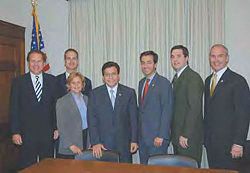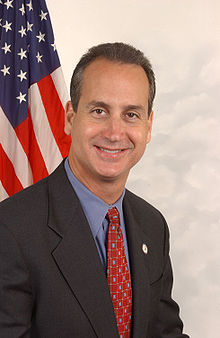- Congressional Hispanic Conference
-
The Congressional Hispanic Conference (CHC) is a Republican Party-controlled caucus in the United States Congress. The CHC was formed in 2003, with the stated goal of promoting policy outcomes of importance to Americans of Hispanic or Latino and Portuguese descent. These priorities included support of the following: then-President George W. Bush and American troops in the war against terrorism; the Free Trade Agreement of the Americas (FTAA); tax relief to families and the over two million Hispanic- and Portuguese-owned small businesses; support for faith based initiatives; and, educational choice for all. The impetus behind the Conference's creation was the debate surrounding the nomination of conservative lawyer Miguel Estrada to the DC Circuit Court of Appeals.[1][2] The Congressional Hispanic Conference should not be confused with the older Congressional Hispanic Caucus, which is a similar organization controlled by Democratic congresspeople.
Contents
History
In the mid to late 1990s, the Republican members of the Congressional Hispanic Caucus – Mexican-American Henry Bonilla of Texas and Cuban-Americans Ileana Ros-Lehtinen and Lincoln Diaz-Balart of Florida – left the Caucus in protest over its support for improved relations with Cuba.[3] While Ros-Lehtinen remained an active member of the CHC's public outreach arm, the Congressional Hispanic Caucus Institute, the Caucus has since been comprised solely of Democratic and Democratic-caucusing independent legislators.[4][5]
Feeling there was "significant need" for a "new Hispanic conference" newly elected Florida congressman Mario Diaz-Balart began to organize in 2002 a caucus for Hispanic Republicans to counter what they felt was Democratic dominance over Hispanic political affairs. On March 17, 2003, Diaz-Balart revealed the formation of the Conference in an open letter published in the Wall Street Journal.[1] Joined by Bonilla, Ros-Lehtinen, his brother Lincoln, and newly elected colleague Devin Nunes, a California congressman of Portuguese (Azorean) descent, Diaz-Balart decried what he perceived as Hispanic Democratic efforts to derail the nomination of Estrada, a selection seen by some at the time as a possible fast track to the U.S. Supreme Court.[3][6] The group was officially announced at a press conference two days later. They were soon joined by two more Portuguese American congressmen, Richard Pombo of California and Patrick Toomey of Pennsylvania.[7]
Like their Democratic counterpart, the Conference allows members from the Senate. Mel Martinez, the first Cuban-American US Senator, joined the group shortly after his election in 2004. Additionally, the Conference is open to non-Hispanic "associate" members who represent districts with significant Hispanic populations or generally support its goals with regards to public policy.[8][9] In 2003, Conference members also formed the Congressional Hispanic Leadership Institute as an equivalent to the Democratic CHC-affiliated CHCI.
In the 2006 and 2008 elections, the Conference suffered the loss of nearly half of their members to electoral defeat, attempts at higher office or resignations. Past chair, Luis Fortuño, left Congress after being elected Governor of Puerto Rico. After the 2010 midterm elections, six new Hispanic Republicans were elected to Congress: Senator Marco Rubio of Florida, Representatives David Rivera of Florida, Raúl Labrador of Idaho, Francisco Canseco and Bill Flores of Texas, and Jaime Herrera Beutler of Washington, as well as Portuguese American Senator Pat Toomey of Pennsylvania, who was a member of the conference when he served in the House.
Membership
Active members as of the 112th Congress:
Officers
- Chair: Mario Diaz-Balart (FL-21) (R)
- Vice-Chair: Francisco "Quico" Canseco (TX-23)
- Executive Director:
Full members
- Rep. Bill Flores (TX-17) (R)
- Rep. Jaime Herrera Beutler (WA-3) (R)
- Rep. Raúl Labrador (ID-1) (R)
- Rep. Devin Nunes (CA-21) (R)
- Rep. David Rivera (FL-25) (R)
- Rep. Ileana Ros-Lehtinen (FL-18) (R)
- Sen. Marco Rubio (Florida) (R)
- Sen. Pat Toomey (Pennsylvania) (R)
Associate members
- Rep. Mary Bono Mack (CA-45) (R)
- Rep. Trent Franks (AZ-2) (R)
- Rep. Randy Neugebauer (TX-19) (R)
- Rep. Steve Pearce (NM-2) (R)
- Rep. Pete Sessions (TX-32) (R)
Past chairs
- 2003–2005: Ileana Ros-Lehtinen (FL-18) (R)
- 2005–2007: Ileana Ros-Lehtinen (FL-18) (R)
- 2007–2009: Luis Fortuño (PR-RC) (PNP/R)
Former members
- Henry Bonilla 2003–2007
- Bob Beauprez 2003-2007 {associate member}
- J. Gresham Barrett 2009–2011 {associate member}
- Lincoln Díaz-Balart 2003–2011
- Chris Cannon 2003-2009 {associate member}
- Luis Fortuño 2005–2009 {Now Governor of Puerto Rico}
- Mel Martinez 2005–2010
- Richard Pombo 2003–2007
- Jon Porter 2003–2007 {associate member}
- Rick Renzi 2003-2009 {associate member}
- Jerry Weller 2003-2009 {associate member}
See also
References
- ^ a b Henry Bonilla, et al., "We the (Hispanic) People...," Wall Street Journal (March 17, 2003)
- ^ Julian Pecquet, "Latinos Take Over Washington," Adelante (April 2003)
- ^ a b Maria Recio, "Hispanic Republicans Form Interest Group," HispanicBusiness.com (March 19, 2003)
- ^ CHCI, Board of Directors CHCI. Accessed on May 5, 2009.
- ^ Congressional Hispanic Caucus, CHC Main Page, Membership (sidebar) Office of Nydia Velasquez. Accessed on May 31, 2009.
- ^ Robert A. George, "Sonia Sotomayor (For life)," NBC Washington.com (May 28, 2009)
- ^ Congressional Hispanic Conference, "The Congressional Hispanic Conference Applauds the Passage of the Naturalization Bill for Immigrant Service Men and Women," (press release) Hispania News (November 14, 2003)
- ^ Office of Rep. J. Gresham Barrett, "Congressman Gresham Barrett Joins the Congressional Hispanic Conference," (press release) House.gov (March 31, 2004)
- ^ Office of Rep. Bob Beauprez, "Rep. Bob Beauprez of Colorado Joins the Congressional Hispanic Conference," (press release) HispanicBusiness.com (April 27, 2004)
Categories:- Caucuses of the United States Congress
- Hispanic and Latino American people in the United States Congress
- Republican Party (United States) organizations
- Issue-based groups of legislators
Wikimedia Foundation. 2010.


